高一英语必修一unit4知识点
高一英语必修一unit4知识点总结

高一英语必修一unit4知识点总结高一英语必修一unit4知识点总结11. right away毫不迟疑,立刻2. It seemed as if the world was at an end. 世界似乎到了末日。
从句表示“(在某人)看来好像;似乎”① It seems/looks/appears as if/though…看起来好像…② Sb./Sth. looks as if/though…③ There seems/appears(to be)…There appears to have been a mistake.3. Two-thirds4. Workers built shelters for survivors whose homes had been destroyed.5. under the weight of 在……重压下,迫于6. in the open air 在户外,在野外,露天7. take turns to do sth依次,轮流做某事in turn 依次地,轮流地8. be shocked at 对……感到震惊9. be proud of 以……为自豪10. express one’s thanks to sb /for sth… 对/因……表示感谢11. without warning 毫无预兆12. next to紧接着,相邻,次于13. get away from… 避免,摆脱,离开14. disaster-hit areas灾区15. Listening to English is a very important skill because it is only when we understand what is said to us that we can have a conversation with somebody. 听英语是一项很重要的技能,因为只有当我们懂得别人给我们说什么我们才能与他交谈。
高一英语必修一Unit4Earthquakes知识点讲解和练习

1、关系代词which用来指物,在从句中可作主语或宾语。
This is a book which tells about space rocket technology.(作主语)
The letter which I received yesterday was from my brother.(作宾语)
【归纳总结】
give out分发;发出;用完give sth.away赠送;颁发;泄露
give back归还;复原givein呈上;倒戈,屈服,认输
give off发出,放出give over停止,中止
give up放弃give on to/onto sth.朝向,面对;通向
8、Your speech was heard by a group of fivejueges,all of whom agreed that it was thebest one this year.
易混词
辨析
例句
injury
多指意外事故受伤。比hurt正式,hurt多指伤痛,而injure则指损害健康、成就、容貌等,强调功能的损失。
A bullet injured his lefgt eye.
hurt
既可指肉体上的损害,也可指精神上、感情上的损害;作不及物动词,意为“(身体某部位)难受”。指肉体上的损害时,hurt可与badly,slightly,seriously等连用,但若指精神上的创伤,只能说very much/rather/deeply hurt。
(1)n.裁判员;法官;审判员
His father used to be a judge.他的父亲过去是一名法官。
(2)v.推断;断定
Unit4 单词、短语及句式-高一英语人教版必修一

Unit 4课文重点单词、短语及重点句式Part I 课文重点单词1. rescue n. & vt. 营救;救援【教材原句】What are the rescue workers and soldiers doing in the flood-hit area? 在受灾地区,救援人员和士兵在做什么?【高考例句】①〔2021北京〕Now, electric shock training and medical treatment are helping to rescue these big birds.现在,电击训练和医疗正在帮助营救这些大鸟。
①〔2021全国1卷〕I work with volunteers for wildlife, a rescue and education organization at Bailey Arboretum in Locust Valley. 我和野生动物志愿者一起工作,这是一个位于蝗虫谷贝利植物园的救援和教育组织。
【常用搭配】rescue sb./ sth. from…从……中营救某人/某物come to sb’s rescue 营救某人【练一练】1.Firefighters _______________ from a burning building.消防队员从着火的大楼里救出了一个孩子。
2. damage vt. 损害;破坏n. 损坏;损失【教材原句】Which buildings were damaged in Seoul?首尔哪些建筑物受损?【高考例句】〔2021北京〕But if the damage is caused by the user, you will have to pay for the repair. 但是,如果损坏是由用户造成的,那您必修支付维修费用。
【常用搭配】do damage to sb/sth对……造成损害【练一练】1._____________________________________________________. 吸烟严重损害健康。
人教版高一英语必修1Unit4课本知识点详解及练习

人教版高一英语必修 1 Unit4 课本知识点详解及练习Unit4 Earthquakes知识点详解Ⅰ. 常考单词必背1. burst vi. (burst,burst) 爆裂;爆发n. 突然破裂;爆发She burst into tears on hearing the sad news.一听到这一不幸消息,她突然哭了起来。
Upon his appearance,there was a burst of applause.他一出现就爆发了一阵掌声。
[快速闪记](1)burst in打断;闯入;突然出现burst into...突然开始;闯入……burst into laughter/tears =burst out laughing/crying突然大笑/哭起来(2)a burst of一阵……2. injure vt. 损害;伤害Most of the injured were women and children.大多数伤员都是妇女和儿童。
[快速闪记](1)injured adj.受伤的the injured伤员(2)injury n.伤;伤口;伤害3. shock vt.& vi.(使)震惊;震动n. 休克;打击;震惊I was shocked to hear that he had resigned.听到他辞职的消息我感到很震惊。
The news of my promotion came as a shock.我获晋升的消息着实让我一惊。
[快速闪记](1)be shocked by/at...对……感到震惊be shocked to do...因做……而震惊(2)a shock一件令人震惊的事(抽象名词具体化用法)(3)shocked adj.感到震惊的shocking adj.令人震惊的4. rescue n.& vt.援救;营救All the people nearby came to her rescue when hearing her cry for help. 周围的人们听到她的呼救声都来营救她。
人教版高一英语必修一unit4重点单词 短语

人教版高一英语必修一unit4重点单词短语1. devote (v.): To give all or a large part of one's time or resources to a particular person, activity, or cause.- She devoted her life to helping the less fortunate.- He has devoted himself to studying medicine.2. determination (n.): The act of deciding definitely and firmly; the quality of being resolute or firm in purpose.- With great determination, she managed to overcome all the obstacles and achieve her goals.- The team showed great determination in winning the game.3. strategy (n.): A plan of action designed to achieve a long-term or overall aim.- The company developed a new marketing strategy to increase sales.- The coach came up with a winning strategy for the game.4. collaborate (v.): To work together with others on a project or task.- The scientists collaborated on a research project.- The two companies decided to collaborate on a new product.5. launch (v.): To start or set in motion.- The company plans to launch its new product next month.- The government launched an investigation into the corruption scandal.6. generate (v.): To produce or create something.- The wind turbines generate electricity.- His speech generated a lot of excitement among the audience.7. fulfill (v.): To do or achieve what was expected; to satisfy or meet a requirement or condition.- She finally fulfilled her dream of becoming a doctor.- The company fulfilled its promise to deliver the product on time.8. access (v.): To obtain or retrieve information or data.- Students can access online resources through the school's website.- The new software allows users to access files from anywhere.9. inspire (v.): To motivate or encourage someone to do something creative orworthwhile.- Her story inspired many people to volunteer and help others.- The coach's words of encouragement inspired the team to victory.10. overcome (v.): To succeed in dealing with a problem or difficulty.- Despite facing many challenges, he managed to overcome them and achieve success.- The team overcame a 2-0 deficit and won the game.11. privilege (n.): A special right, advantage, or immunity granted or available only to a particular person or group.- It is a privilege to have access to quality education.- Being able to travel is a privilege that not everyone has.12. make a difference (phrase): To have a positive impact or effect on something or someone.- Every small action can make a difference in someone's life.- We need more volunteers to make a difference in our community.13. take action (phrase): To do something in response to a situation or problem.- It's time to stop talking and start taking action.- She took action to help the homeless by starting a charity organization.14. start from scratch (phrase): To begin something from the very beginning, without any prior work or knowledge.- After losing everything, he had to start from scratch and rebuild his life. - The company went bankrupt and had to start from scratch.15. have a passion for (phrase): To have a strong enthusiasm or love for something.- She has a passion for music and plays the piano every day.- He has a passion for cooking and dreams of becoming a chef.16. in pursuit of (phrase): In an attempt to achieve or attain something.- He left his job in pursuit of a more fulfilling career.- They are traveling the world in pursuit of adventure.17. set goals (phrase): To establish specific aims or objectives to be achieved.- It's important to set goals and work towards them.- The team set goals for the upcoming season.18. work towards (phrase): To make efforts to achieve or accomplish something.- She is working towards her degree in law.- We must all work towards a more sustainable future.19. make sacrifices (phrase): To give up something valuable or important for the sake of something else.- He made sacrifices to provide for his family.- They made sacrifices to save money for their dream vacation.20. stay focused (phrase): To maintain concentration and effort on aparticular task or goal.- It's important to stay focused if you want to succeed.- She stays focused on her studies and achieves top grades.21. never give up (phrase): To persist in an endeavor despite difficulties or setbacks.- His determination and refusal to give up led him to success.- She never gives up and always tries her best.22. time management (phrase): The ability to plan and organize one's time effectively.- Good time management is essential for students to balance their studies and social life.- She excels in time management and always meets her deadlines.23. think outside the box (phrase): To think in a creative and unconventional way.- We need to think outside the box to solve this problem.- His innovative ideas come from thinking outside the box.24. take initiative (phrase): To act independently and take charge of a situation without being prompted.- She took the initiative to organize a community clean-up event.- He took initiative and proposed a new project to his boss.25. be committed to (phrase): To be dedicated and loyal to a person, cause, or task.- She is committed to her fitness and goes to the gym every day.- The company is committed to providing excellent customer service.26. pursue a career (phrase): To follow a particular profession or occupation.- He is pursuing a career in engineering.- She pursued a career in journalism after graduating from college.27. achieve success (phrase): To accomplish a desired aim or objective.- Hard work and determination will lead to success.- The team achieved success by winning the championship.28. face challenges (phrase): To encounter difficulties or obstacles that must be overcome.- Starting a business involves facing many challenges.- They faced challenges but worked together to find solutions.29. make progress (phrase): To advance or develop towards a better or more advanced state.- She is making progress in her language learning.- The project is making good progress and should be completed on time.30. have ambitions (phrase): To have strong desires or aspirations for achieving something.- He has ambitions to become a successful entrepreneur.- She has ambitions to travel the world and explore different cultures.31. break new ground (phrase): To do something that has never been done before; to innovate. - The researchers broke new ground with their discovery of a new species.- The company is breaking new ground by investing in renewable energy sources.32. build relationships (phrase): To establish and develop connections with others.- It's important to build relationships with your colleagues for a harmonious work environment. - She has built strong relationships with her clients, which has helped her business grow.33. communicate effectively (phrase): To convey information or ideas clearly and efficiently.- Good communication skills are essential for success in any field.- He communicates effectively with his team, which improves their productivity.34. dream big (phrase): To have ambitious goals or aspirations.- You should dream big and work hard to achieve your goals.- She has always dreamed big andpires to be the first in her family to graduate from college. 35. embrace change (phrase): To accept and welcome change, especially when it is necessary or inevitable.- In order to stay competitive, businesses must embrace change and adapt to new technologies. - He embraces change and sees it as an opportunity for growth and learning.36. exceed expectations (phrase): To perform better than what was expected or required.- She always exceeds expectations in her work, which has earned her a promotion.- The team worked hard and exceeded expectations by finishing the project ahead of schedule.37. give back (phrase): To return a favor or to contribute to a community or cause.- It's important to give back to the community that has supported you.- He gives back by volunteering at a local shelter and helping those in need.38. lead by example (phrase): To set a good example for others to follow.- A good leader leads by example and inspires others to do their best.- She leads by example and is always the first to arrive and the last to leave.39. learn from mistakes (phrase): To gain knowledge or understanding from past failures or errors.- It's okay to make mistakes as long as you learn from them.- The company learned from its mistakes and made improvements to its product.40. maintain balance (phrase): To keep different aspects of one's life in a state of equilibrium.- It's important to maintain a balance between work and personal life.- She maintains balance by setting aside time for her hobbies and spending time with family.41. manage conflict (phrase): To handle disagreements or disputes in a way that is fair and peaceful.- Good managers know how to manage conflict and keep the team working together.- They managed the conflict by sitting down and discussing their differences.42. meet deadlines (phrase): To complete a task or deliver a product by the agreed-upon time.- Meeting deadlines is crucial for maintaining a good reputation with clients.- She always meets her deadlines and is known for her reliability.43. motivate others (phrase): To inspire or encourage others to take action or to work towards a goal.- A good leader knows how to motivate others and bring out their best.- He motivated his team with a vision of success and a plan to achieve it.44. pursue excellence (phrase): To strive for the highest standards and quality in one's work or endeavors.- The company pursues excellence in all aspects of its operations.- She pursues excellence in her craft and is always looking for ways to improve.45. take responsibility (phrase): To accept accountability for one's actions or the outcomes of a situation.- It's important to take responsibility for your mistakes and learn from them.- He took responsibility for the failure of the project and worked to fix the issues.46. think critically (phrase): To analyze situations or problems in a logical and thoughtful way. - Thinking critically is an important skill for problem-solving and decision-making.- She thinks critically about every decision and considers the potential consequences.47. value diversity (phrase): To recognize and appreciate the differences among people.- A diverse workforce brings different perspectives and ideas to the table.- He values diversity and promotes an inclusive work environment.48. work as a team (phrase): To collaborate and cooperate with others to achieve a common goal. - Working as a team can lead to better results and a more positive work environment.- They work as a team and support each other to overcome challenges.49. adapt to change (phrase): To modify or adjust one's behavior, work, or situation in response to new circumstances.- Adapting to change is necessary in a rapidly evolving world.- She has learned to adapt to change and is open to new ideas and approaches.。
高一英语必修一单词知识点总结:Unit4
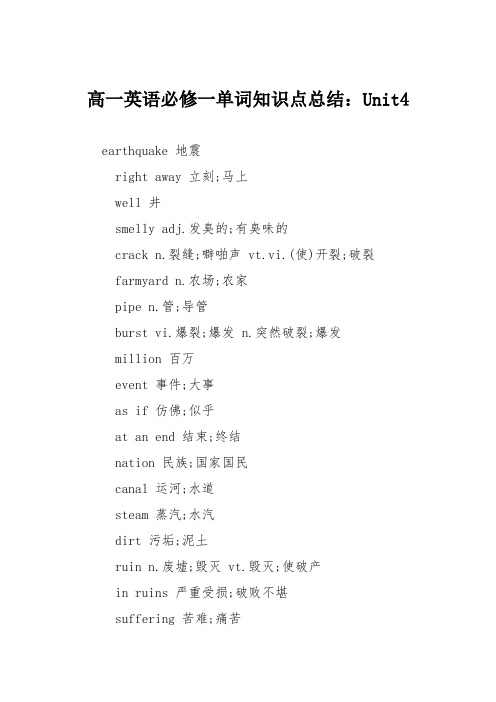
高一英语必修一单词知识点总结:Unit4earthquake 地震right away 立刻;马上well 井smelly adj.发臭的;有臭味的crack n.裂缝;噼啪声 vt.vi.(使)开裂;破裂farmyard n.农场;农家pipe n.管;导管burst vi.爆裂;爆发 n.突然破裂;爆发million 百万event 事件;大事as if 仿佛;似乎at an end 结束;终结nation 民族;国家国民canal 运河;水道steam 蒸汽;水汽dirt 污垢;泥土ruin n.废墟;毁灭 vt.毁灭;使破产in ruins 严重受损;破败不堪suffering 苦难;痛苦extreme 极度的injure 损害;伤害survivor 幸存者;生还者;残存物destroy 破坏;毁坏;消灭brick 砖;砖块dam 水坝;堰堤track 轨道;足迹;痕迹useless 无用的;无效的;无益的shock vt.vi.(使)震惊;震动 n.休克;打击;震惊 rescue n.vt.援救;营救trap vt.陷入困境 n.陷阱;困境electricity 电,电流;电学disaster 灾害;灾祸dig out 掘出;发现bury 埋葬;掩埋;隐藏mine 矿;矿山;矿井miner 矿工shelter 掩蔽;掩蔽处避身处a(great)number of 许多;大量的title 标题;头衔;资格reporter 记者bar n.条;棒;条状物damage n.vt.损失;损害frighten 使惊吓;吓唬frightened 受惊的;受吓唬的frightening 令人恐俱的congratulation 祝贺;(复数)贺词judge n.裁判员;法官 vt.断定;判断;判决 sincerely 真诚地;真挚地express vt.表示;表达 n.快车;速递outline 要点;大纲;轮廓headline 报刊的大字标题cyclist n.骑自行车的人。
高一英语必修一_unit4_知识点

hurt His words ______her feelings.
hurts It ______the eyes to read in the sun.
injured More than 200 people were _________in the car accident. wounded The soldiers were __________-in the battle.
•ruin n.【C】倒塌的建筑物,废墟
短语:be/lie in ruins 倒塌,破败不堪
fall into ruins 衰落,败落
eg: 现在这座城市已成为一片废墟了。
The city now is/lies in ruins.
• ruin oneself/hopes v. 毁灭,毁坏
e.g.. If you go on like this, you will ruin youself.
7.extreme极度的,极端的,偏激的
• extreme weather • extreme condition • extreme sports
• extremely adv.
9.shock vi.&vt. (使)震惊,震动 n. 休克,打击,震惊
shocking The news is ___________(shock).
2. A smelly gas smelly : smell+ y = adj.
smell n./v (smelt/ smelled)
扩展: n.+y构成形容词
blood + -y = bloody rain + -y = rainy cloud + -y = cloudy wind + -y = windy snow + -y = snowy greed + -y = greedy taste+ -y = tasty sun + -y =sunny ice + -y = icy fat + -y = fatty mud+ -y = muddy 泥泞的 fog + -y = foggy health wealth
高一英语必修一Unit4重点英语词汇和句子

高一英语必修一Unit4重点英语辞汇和句子Unit 4 EarthquakesWord usage1. shake 1)v. (shook, shaken)to (cause to) move up and down or from side to side with quick short movements. 2) n. [C usually sing.] an act of shakingThe house shook when the earthquake started.Shake the bottle before taking the medicine.He came forward and shook me by the hand. =He came forward and shook hands with me.He was shaking with anger.She answered “no” with a shake of the head.2. rise 1) vi. (rose, risen) to move from a lower to a higher level or position; go up 2) n. [C (in)] an increase in quantity, price, demand etc.The sun has not yet risen.The population of the city has risen to five million.He rose and left the room.There will be a rise in unemployment nextyear.There’s been a sharp rise in the cost of living.2. pond n. an area of still water smaller than a lake, especially one that has been artificially madeSome cattle were drinking at the pond.There are some fish living in the pond.When an earthquake is coming, fish will jump out of ponds.3. burst 1) v. to (cause to ) break open or break apart suddenly and violently, usually as a result of pressure from within and often cause the contents to become widely scattered.2) n. an act of result of bursting; (of) a sudden short period of great activity, loud noise, strong feeling; outbreakThe balloon burst.After ten days of rain the river burst its banks.A burst of hand-clapping followed the ending of the song.4. canal n. an artificial stretch of water dug in the ground to allow ships or boats to travel alongit, or to bring water to or remove water from an areaCoal used to be sent here bycanal.Canals have been built to irrigate the desert.The Panama Canal joins two oceans.5. steam n. [U] 1) water in the state gas produced by boiling2) power or effort produced by steamunder pressure, and used for making things work or moveWho invented the steam engine?Steam was used to be the power of a train.There is steam bursting from that hole.6. ruin 1. n. a) [U] the cause or state of destruction and decayb) [C] a building that has been badly damaged or destroyed2. vt. a) to spoil or completely destroy a person or thingb) to cause someone to loss all their moneyThe temple has fallen into ruin.We visited the ruins of the temple.The heavy rain ruined our holiday.The hurricane ruined all the houses here.The flood ruined the crops.If I lose my lawsuit(官司), the cost willruin me.7. injure vt. to cause physical harm to (a person or animal), especially in an accident; hurt seriously; to damageI hope I didn't injure her feelings.His back was injured.Two people were killed and seven were injured.His reputation will be badly injured by the vicious rumour.8. destroy vt. to damage sth so severely that it can not be repaired; put an end to the existence of; ruinA fire destroyed the house.What he said destroyed our last hope.All hopes of peaceful settlement were destroyed by his speech.9. brick n. [C,U] 1) a hard piece of baked clay used for building2) sth. in the shape of a brickThey used yellow bricks to build the house.The tower is made of bricks.Bricks covered the ground like red autumn leaves.10. useless adj. not of any useThis knife is so blunt. It’s useless.I realized it was useless to reason with him.I was useless at maths. = My maths is very poor.11. shock 1) n.a) [C, U] a violent force from sth such as explosion, a crash or a hard blowb) [C, U] the feeling you get after sth unexpected and usually very unpleasant has suddenly happened, or you have received an unexpected piece of newsc) the poor medical condition of someone who has an accident and whose heart and lungs are not working properly2) v. to make someonefeel very upset, angry, or unpleasantEarthquake shocks areoften felt in Japan.The news of his death was a shock tous.The traffic accident sent him into a state of shock.They were shocked by her rudeness.We were shocked by his sudden death.12. rescue v. to save someone or sth from harm or dangerHe rescued three children from the burning building.The life boat was sent out to rescue the sailors from the sinking ship.The boy was rescued after hours at sea.13. disaster n. [C,U] a sudden event causes great loss or harmWe were all shocked by the disaster.The earthquake is one of the worst natural disasters the country has ever suffered. People beganto wonder how long the disaster would last.14. organize v. to plan and arrange an event; to arrange things in a sensible orderWe'll organize an oral English contest.The story is very well organized.They organized the truckers into a union.15. shelter 1) n. a) [U] protection, especially from bad weatheror danger b) a building that protects you from weather or danger.2) vt. to protect someone or sth from bad weather or danger;vi. to stay in a place in order to be protected frombad weather or dangerThe umbrella is a poor shelter from heavy rain.Their immediate need is for food, clothing andshelter.The wall sheltered us from the wind.She was accused of sheltering a murderer.She wad sheltered by the USA.In the rain people were sheltering in the doorways of shops.16. fresh adj.1) new and different (only before a noun ); 2) recently picked, caught, produced and therefore in good condition (used of food); 3) clean, cool and pleasantThey buy fresh meat.Thiskind of fish lives in fresh water.She is fresh fromuniversity.She is quite fresh to office work.17. percent n. parts for each 100The bank has increased its interest rate by one percent.Over ninety percent of the islanders here areilliterate.He spends a large percent of his income on food and drink.18. speech n. 1) [C] a formal talk to a group oflisteners2) [U] the ability to speak or the act of speaking3) [U] way of speakingThe chairman made an opening speech.She is researching speech development in children.We express our thoughts by speech.By your speech I can tell you're from Hong Kong.19. judge 1) vi. & vt. to decide who or what is thewinner in a competition2) [vt. + that] to form or give an opinion about someone or sth after careful thoughtjudging from, judging by…3) n. a public official who has the power todecide questions brought before a court of law; a person who has the knowledge and experience to give an opinion about the value of sthYou can't judge a book by its cover.He is going to judge the first race.We must judge whether he is guilty.The prisoner was taken before the judge.He was one of the judgesat the horse race.20. honour 1) n. a) [U] great respect and admirationb) [sing] sth that brings great respect and pride2) v. to show respect to sb. or to praise sb. publiclyWe fightfor the honor of our country.He is an honor to ourschool.Children should be taught to show honor to theirelders.He honors his teachers.20. prepare 1) vt. to make sth. ready for a future event or action2) vi. to get ready to do sth.They prepared themselves for the worst.When we arrived home, mother had already prepared dinner for us.I waspreparing for bed when I heard a knock at the eful expressions1. right awayat once ; in no time; immediatelyIwill return the book right away.I am getting in touch with him right away.We are about to start right away.2. end1) at an endfinish; overIt seems that the world was at en end.2) bring… to an end =put an end to…I wonder how I can bring the dispute to an end.=I wonder how I can put an end to thedispute.3) come to an endThe meeting came to an end at midnight.4) at the end of…At the end of the road there is a shop.5) by the end of…How many English words have you learned by the end of last term?6) in the end =at last; finallyHe will be a scientist in the end.3. dig out1) to get sth out of a place, using a spade or your hands2) to find sth you have not seen for a long time, or that is not easy to findLet’s dig out the roots.Why did you dig out all those old magazines?We must dig the truth out of him.1. a (good \ great \ large) number of+ n.(pl.)many; a large quantity of; a lot ofA good number of students are not interested in modern art.I’ve seen the film a number of times.The Great Wall attracts a great number of foreign tourists every day.the number of…The number of private colleges has increased.= Private colleges have increased in number.5. give out1) to give sth to a number of different people, especially to give information to people2) to produce light, heat, a sound, a gas, smell etcYou have no right to give my telephone number out.Students were giving out leaflets(传单)to everyone on the street.The teacher gave out the examination papers.The radiator (散热器) is giving out a lot of heat.与give有关的常用短语还有:give away 送掉,捐赠give in 让步,屈服give off 发出(气味、光、热、声音等),此时相当于give outgive up 舍弃give back 归还6. thousands of基数词+s,并不表示确切的具体数字,可以单独使用,也能够先接介词of再接复数名词。
Unit 4 Natural Disasters 词汇知识点 高一英语(人教2019版必修第一册)
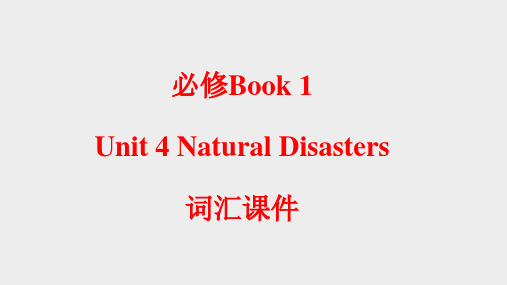
• 复活; (使)苏醒
• 【同根词】
• revival n[U]&[C]振兴;复苏
effort
•n
• ①[U]&[C]气力;精力 • be (well) worth the effort 值得努力 • without effort毫不费力地 • ②[C]努力;尽力 • make an effort/efforts to do sth 努力做某事 • spare no effort不遗余力 • ③[C] [常用于名词后]有组织的活动
destroy
• vt
• ①毁坏;摧毁;毁掉。 • ②消灭;杀死
• 【同根词】
• destruction n[U]毁坏,毁灭 • destructive adj.具有毁灭性的
evacuate
•v
• ①vt (把人从危险的地方)疏散;撤离 • ②vt&vi (从危险的地方)撤出;撤空
helicopter
pipe
•n
• [C]&[U]管子;导管;烟斗
whistle
• vi
• 吹口哨;鸣笛
•n
• [C]哨子;口哨
emergency
•n
• [C]&[U]紧急情况;突发事件;非常时刻 • an emergency exit 紧急出口
• 【同根词】
• emergent adj.紧急的
calm
• adj
context
•n
• [C]&[U](文章的)上下文;语境; (事情发生的)背景
suffer
•v
• ①vi&vt患(病); (因疾病)受苦 • suffer from...遭受...(疾病) • ②遭受(困难等) • ③(事情)变差;变糟
高一英语必修一unit4知识点总结
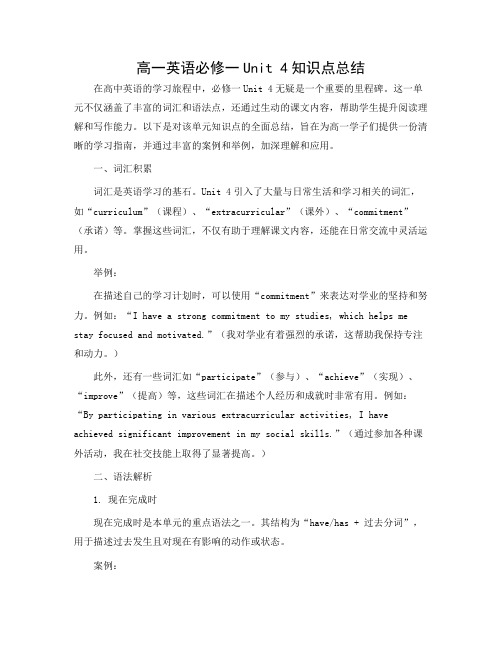
高一英语必修一Unit 4知识点总结在高中英语的学习旅程中,必修一Unit 4无疑是一个重要的里程碑。
这一单元不仅涵盖了丰富的词汇和语法点,还通过生动的课文内容,帮助学生提升阅读理解和写作能力。
以下是对该单元知识点的全面总结,旨在为高一学子们提供一份清晰的学习指南,并通过丰富的案例和举例,加深理解和应用。
一、词汇积累词汇是英语学习的基石。
Unit 4引入了大量与日常生活和学习相关的词汇,如“curriculum”(课程)、“extracurricular”(课外)、“commitment”(承诺)等。
掌握这些词汇,不仅有助于理解课文内容,还能在日常交流中灵活运用。
举例:在描述自己的学习计划时,可以使用“commitment”来表达对学业的坚持和努力。
例如:“I have a strong commitment to my studies, which helps me stay focused and motivated.”(我对学业有着强烈的承诺,这帮助我保持专注和动力。
)此外,还有一些词汇如“participate”(参与)、“achieve”(实现)、“improve”(提高)等,这些词汇在描述个人经历和成就时非常有用。
例如:“By participating in various extracurricular activities, I have achieved significant improvement in my social skills.”(通过参加各种课外活动,我在社交技能上取得了显著提高。
)二、语法解析1. 现在完成时现在完成时是本单元的重点语法之一。
其结构为“have/has + 过去分词”,用于描述过去发生且对现在有影响的动作或状态。
案例:小李在英语课上被问到:“Have you finished your homework?”(你完成作业了吗?)小李回答:“Yes, I have finished it.”(是的,我已经完成了。
2023外研版高一英语必修一Unit4重点知识

2023外研版高一英语必修一Unit4重点知
识
本文档将重点介绍2023外研版高一英语必修一Unit4的相关知识。
1. 单词和短语
本单元涉及的重点单词和短语包括:
- poverty:贫穷
- charity:慈善
- empathy:同理心
- gratitude:感激之情
- stereotype:刻板印象
- bias:偏见
- volunteer:志愿者
- optimism:乐观主义
2. 语法知识
本单元的重点语法知识有:
- 宾语从句:介绍如何使用宾语从句来表达他人的感受和态度。
- 特殊疑问句:研究如何使用特殊疑问词来构造疑问句,以获
取他人的意见和信息。
- used to和be used to:掌握used to和be used to的用法和区别。
3. 阅读和听力技巧
本单元的阅读和听力技巧包括:
- 掌握关键词和上下文推测词义的能力,快速理解文章和对话
的主题和要点。
- 注意细节,提高阅读和听力的准确性。
- 学会有针对性地提问以提高对文章和对话的理解能力。
4. 写作技巧
本单元的写作技巧有:
- 研究如何写一篇有关慈善的英文演讲稿。
- 掌握描述人物外貌和性格特征的表达方式。
- 学会使用恰当的连接词来连接句子和段落,使文章结构更加清晰和连贯。
5. 文化知识
本单元还将介绍一些与慈善和社会问题相关的文化知识,例如不同国家的慈善组织和相关的传统节日。
以上是2023外研版高一英语必修一Unit4的重点知识概述,希望对您有所帮助!。
高一必修一unit4知识点
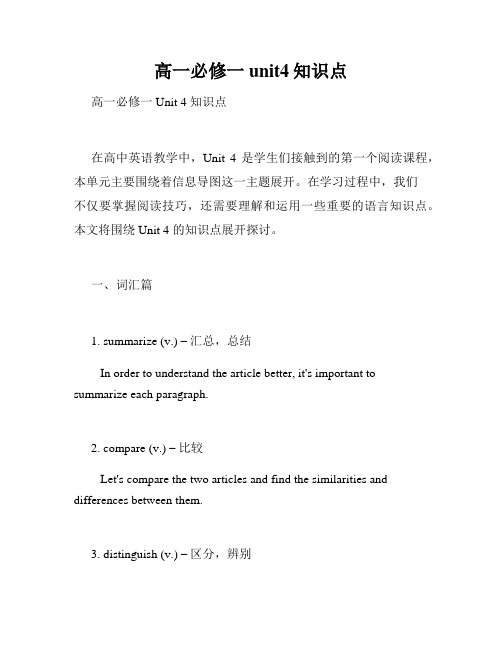
高一必修一unit4知识点高一必修一 Unit 4 知识点在高中英语教学中,Unit 4 是学生们接触到的第一个阅读课程,本单元主要围绕着信息导图这一主题展开。
在学习过程中,我们不仅要掌握阅读技巧,还需要理解和运用一些重要的语言知识点。
本文将围绕 Unit 4 的知识点展开探讨。
一、词汇篇1. summarize (v.) –汇总,总结In order to understand the article better, it's important to summarize each paragraph.2. compare (v.) –比较Let's compare the two articles and find the similarities and differences between them.3. distinguish (v.) –区分,辨别It is difficult to distinguish between twins because they look so similar.4. distinguish…from… –将…与…区分开来It is important to distinguish fact from fiction when reading news sources.5. classify (v.) –分类,归类The books in the library are classified according to genre and author.6. edit (v.) –编辑,剪辑The editor will edit your article before it is published.7. revise (v.) –修订,修改Before submitting the essay, make sure to revise and correct any grammatical errors.8. transfer (v.) –转移,转换The teacher encouraged the students to transfer their knowledge from the textbook to real-life situations.二、语法篇1. used to do sth. –过去常常做某事(现在不做了)I used to play basketball every Sunday, but now I prefer swimming.2. be used to –习惯于After living in the city for a year, I am used to the noise and fast pace of life.3. be/get accustomed to –习惯于She got accustomed to waking up early after a week of early morning meetings.4. be/get used to –习惯于After wearing glasses for a month, she finally got used to them.5. prefer…to… –更喜欢…而不是…I prefer watching movies to reading books because they are more visually stimulating.6. instead of –代替,而不是Instead of going out, I decided to stay at home and work on my homework.7. neither…nor…–既不…也不…Neither John nor Jane enjoys playing video games.8. both…and… –既…and…Both the teachers and the students participated in the school's charity event.三、阅读理解在阅读理解中,我们需要掌握一些常用的阅读技巧,如略读、精读、找关键词等。
高一英语必修一知识点高一英语必修一知识点总结unit4句型

高一英语必修一知识点高一英语必修一知识点总结unit4句型Unit 4 句型总结1. There be 句型- There is/are + 名词 + 地点/情况- There is/are + 数字/量词 + 名词 + 地点/情况- There is/are + 形容词 + 名词 + 地点/情况- There is/are + 名词 + of + 名词 + 地点/情况2. 表示喜欢或爱好的句型- Like/love/enjoy + 动词ing- Like/love/enjoy + 名词3. 句型的疑问形式- 现在简单句:Do/Does + 主语 + 动词原形?- 过去简单句:Did + 主语 + 动词原形?- There be 句型:Is/Are + there + 名词 + 地点/情况?4. 一般过去时句型- 肯定句:主语 + 动词过去式 + 其他- 否定句:主语 + didn't + 动词原形 + 其他- 疑问句:Did + 主语 + 动词原形 + 其他?5. 情态动词 can 表示能力- 肯定句:主语 + can + 动词原形 + 其他- 否定句:主语 + can't + 动词原形 + 其他- 疑问句:Can + 主语 + 动词原形 + 其他?6. 表示习惯的句型- 主语 + 动词(s) + usually/always/often/sometimes + 其他- 主语 + don't/doesn't + 动词 + usually/always/often/sometimes + 其他?7. 特殊疑问句- 特殊疑问词 + 一般疑问句?- 例:When did you go to the zoo?(你什么时候去动物园的?)。
高一(上)英语必修一Unit4-Earthquakes重点单词短语归纳整理
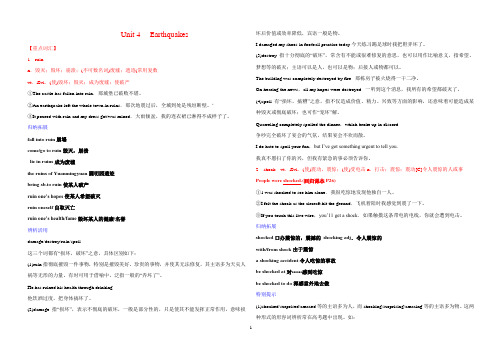
Unit 4 Earthquakes【重点词汇】1 ruinn.毁灭;毁坏;崩溃;(不可数名词)废墟;遗迹(常用复数vt.&vi.(使)毁坏;毁灭;成为废墟;使破产①The castle has fallen into rain.那城堡已破败不堪。
②An earthquake left the whole town in ruins.那次地震过后,全城到处是残垣断壁。
‘③It poured with rain and my dress got/was mined.大雨倾盆,我的连衣裙已淋得不成样子了。
归纳拓展fall into ruin崩塌come/go to ruin毁灭,崩溃lie in ruins成为废墟the ruins of Yuanmingyuan圆明园遗迹bring sb.to ruin使某人破产ruin one’s hopes使某人希望破灭ruin oneself自取灭亡ruin one’s health/fame毁坏某人的健康/名誉辨析活用damage/destroy/ruin/spoil这三个词都有“损坏,破坏”之意,具体区别如下:(1)ruin指彻底摧毁一件事物,特别是摧毁美好、珍贵的事物,并使其无法修复,其主语多为天灾人祸等无形的力量。
有时可用于借喻中,泛指一般的“弄坏了”。
He has ruined his health through drinking.他饮酒过度,把身体搞坏了。
(2)damage指“损坏”,表示不彻底的破坏,一般是部分性的,只是使其不能发挥正常作用,意味损坏后价值或效率降低,宾语一般是物。
I damaged my shoes in football practice today.今天练习踢足球时我把鞋弄坏了。
(3)destroy指十分彻底的“破坏”,常含有不能或很难修复的意思,也可以用作比喻意义,指希望、梦想等的破灭;主语可以是人,也可以是物;后接人或物都可以。
新人教版高一英语必修一第四单元知识点

v. 毁坏;毁掉;使破产
I was ruined by the law case. 我被那场官司搞得倾家荡产。 ruin oneself 毁掉自己 ruin one’s hopes 使某人希望破灭
【拓展】destroy, ruin, damage的区别 ①damage指部分“损坏”、“破坏”或指使用价值有所降低。它可以用
灭”解,也可以指希望、计划等打破。 His hope of being a writer was destroyed. 他想成为一个作家的希望破灭了。
③ruin则表示破坏严重,以致不能修复,但这种破坏不像destroy那样毁灭某 物,而是强调致使该物的使用价值发生了问题。用作动词时,它
作“使毁灭”、“使崩溃”解;用作名词时,它表示“毁灭”、“瓦解”、 “废墟”等抽象概念。
这三个词都是形容词: electric 多指用电作为动力的。 electrical表示与电力生产或使用相关的。 electronic电子的,电子器件的
作动词,也可以用作名词,用作名词时常与to something 连用。 Hundreds of houses in the area were damaged by the storm. 暴风雨毁坏了这
个地区数以百计的房屋。 ②destroy只能用作动词,指彻底破坏,以致不可能修复,常作“破坏”、“毁
【随堂练习】汉译英: 1. 看到邻居们如何对待孩子,我感到震惊。 _____________________________________________________________
2. 他妻子去世的消息对他打击太大了。 _____________________________________________________________
- 1、下载文档前请自行甄别文档内容的完整性,平台不提供额外的编辑、内容补充、找答案等附加服务。
- 2、"仅部分预览"的文档,不可在线预览部分如存在完整性等问题,可反馈申请退款(可完整预览的文档不适用该条件!)。
- 3、如文档侵犯您的权益,请联系客服反馈,我们会尽快为您处理(人工客服工作时间:9:00-18:30)。
高一英语必修一unit4知识点(经典版)编制人:__________________审核人:__________________审批人:__________________编制单位:__________________编制时间:____年____月____日序言下载提示:该文档是本店铺精心编制而成的,希望大家下载后,能够帮助大家解决实际问题。
文档下载后可定制修改,请根据实际需要进行调整和使用,谢谢!并且,本店铺为大家提供各种类型的经典范文,如演讲稿、总结报告、合同协议、方案大全、工作计划、学习计划、条据书信、致辞讲话、教学资料、作文大全、其他范文等等,想了解不同范文格式和写法,敬请关注!Download tips: This document is carefully compiled by this editor. I hope that after you download it, it can help you solve practical problems. The document can be customized and modified after downloading, please adjust and use it according to actual needs, thank you!In addition, this shop provides you with various types of classic sample essays, such as speech drafts, summary reports, contract agreements, project plans, work plans, study plans, letter letters, speeches, teaching materials, essays, other sample essays, etc. Want to know the format and writing of different sample essays, so stay tuned!高一英语必修一unit4知识点知识能够被获得,并且因为它的本质,知识总是局部的,它永远都不是完整的,所以,一切源于知识的行动也都是局部的、不完整的。
下面给大家分享一些关于高一英语必修一unit4知识点,希望对大家有所帮助。
高一英语必修一unit4知识1重点词汇、短语1. right away 立刻,马上(= at once = in no time)2. asleep 睡着的;熟睡地(fall asleep 入睡)sleep 睡;睡眠sleepy 犯困的3. it seems that/as if…看来好像…;似乎4. in ruins 成为废墟5. the number of …的数量(做主语时,谓语动词用单数)a number of 大量(做主语时,谓语动词用复数)6. rescue workers 营救人员come to one’s rescue 营救某人7. be trapped 被困8. how long 多长时间how often 多久一次,指频率how soon 还要多久(用于将来时当中,用in+时间段回答)9. hundreds of thousands of 成千上万的10. dig out 挖出11. shake----泛指“动摇,震动”,常指左右、上下动摇,也可以指人“震惊,颤抖”例:She felt the earth shaking under him.She was shaken with anger.quake---- 指较强烈的震动,如地震The building quaked on its foundation.tremble---- 指人由于寒冷、恐惧、不安等引起的身体的抖动或声音的颤抖例:Suddenly I saw her lips begin to tremble and tears begin to flow down her cheeks.shiver---- 多指寒冷引起的颤抖、哆嗦例:A sudden gust of cold wind made me shiver.12. rise (rose—risen)---- vi, 上升;升起,无被动语态give rise to 引起raise(raised—raised)---- vt, 举起;筹集;养育arise ( arose—arisen)----vt, 出现(常指问题或现象)13. injure---- 常指因意外事故造成的损伤,也可以指感情上名誉上的伤害例:He was injured in a car accident.harm---- 泛指“伤害,损害”,既可以指有生命的,也可以指无生命的例:He was afraid that his fury(暴怒) would harm the child.His business was harmed for some reason.hurt---- 既可以指肉体上的伤害,也可以指精神上的伤害例:She hurt her leg when she fell.He felt hurt at your word.wound---- 一般指枪伤、刀伤等在战场上受的伤例:The bullet wounded him in the arm.14. be prepared for …= make preparations for…为…做准备15. in one’s honor 向…表示敬意;为纪念be/feel honored to do…做…感到很荣幸16. make /give/deliver a speech 发言opening speech 开幕词17. give/ provide shelter to…向…提供庇护所seek shelter from…躲避18. happen to do sth. 偶然;碰巧happen ----指偶然发生take place----指事先计划好的事情发生高一英语必修一unit4知识2重点句型1. The number of people who were killed or injured in the earthquake reached more than 400,000.(定语从句)死伤的人数达到40多万。
2. The army organized the rescue workers to dig out those who were trapped and to bury the dead. (定语从句) 部队组织救援人员将受困的人们挖出来,将死者掩埋。
3. All hope was not lost. = Not all hope was lost.(部分否定)不是所有的希望都破灭了。
4. None of us were allowed to go there.(全部否定)我们全都不许去那里。
5. He rescued the man from drowning.他救了一男子使之免遭溺毙。
6. An earthquake left the whole city in ruins.地震过后,全城到处是残垣断壁。
7. I feel highly honoured by your trust.得到你的信任,我感到非常荣幸。
8. Professor Yu organized his thoughts before giving the speech.于教授在演讲之前组织了一下思路。
9. Many people took shelter from the rain in the department store.许多人在百货公司里避雨。
10. It seemed that the world was at an end as the earthquakedestroyed nearly everything.世界似乎到了末日,因为地震几乎毁了一切。
11. People began to wonder how long the disaster would last.人们开始纳闷,这场灾难还会持续多久?12. They used candles all the time instead of electricity.他们一直用蜡烛,没有用电。
13. The one million people of the city, who thought little of these strange events, went to bed as usual that night.(非限制性定语从句)这城市的一百万居民几乎都没有把这些奇怪的情况当一回事,当天晚上照常上床睡觉了。
14. We’d better prepare him for the bad news.我们最好让他做好知道这个坏消息的心理准备。
15. The rubbish gave out a smelly gas.垃圾发出一阵臭味。
16. I am getting in touch with him right away.我马上跟他联系。
17. Are you willing to do public service work without pay?你愿意无偿从事公益活动吗?18. Do you easily lose heart when you are in trouble?你处于不幸中时容易丧失信心吗?高一英语必修一unit4知识3语法总结定语从句概念:在复合句中,修饰名词或代词的从句叫做定语从句。
成分:先行词,即被定语从句修饰的名词或代词;关系代词:that,which,who(宾格为whom,所有格为whose);或者关系副词where,when,why等。
关系代词或关系副词处在先行词和定语从句之间,起着连接主从句的作用。
1. 关系代词that的用法关系代词that在定语从句中既能指人,也能指物;既能做主语,也能做宾语。
例:1)A plane is a machine that can fly. (指物,作主语)2)The noodles (that) I cooked were delicious. (指物,作宾语,可省略)3)Who is the man that is reading a book over there? (指人,作主语)4)The girl (that) we saw yesterday was Jim’s sister,(指人,作宾语,可省略)2. 关系代词which的用法关系代词which在定语从句中只能指物,既可以做宾语也能作主语。
